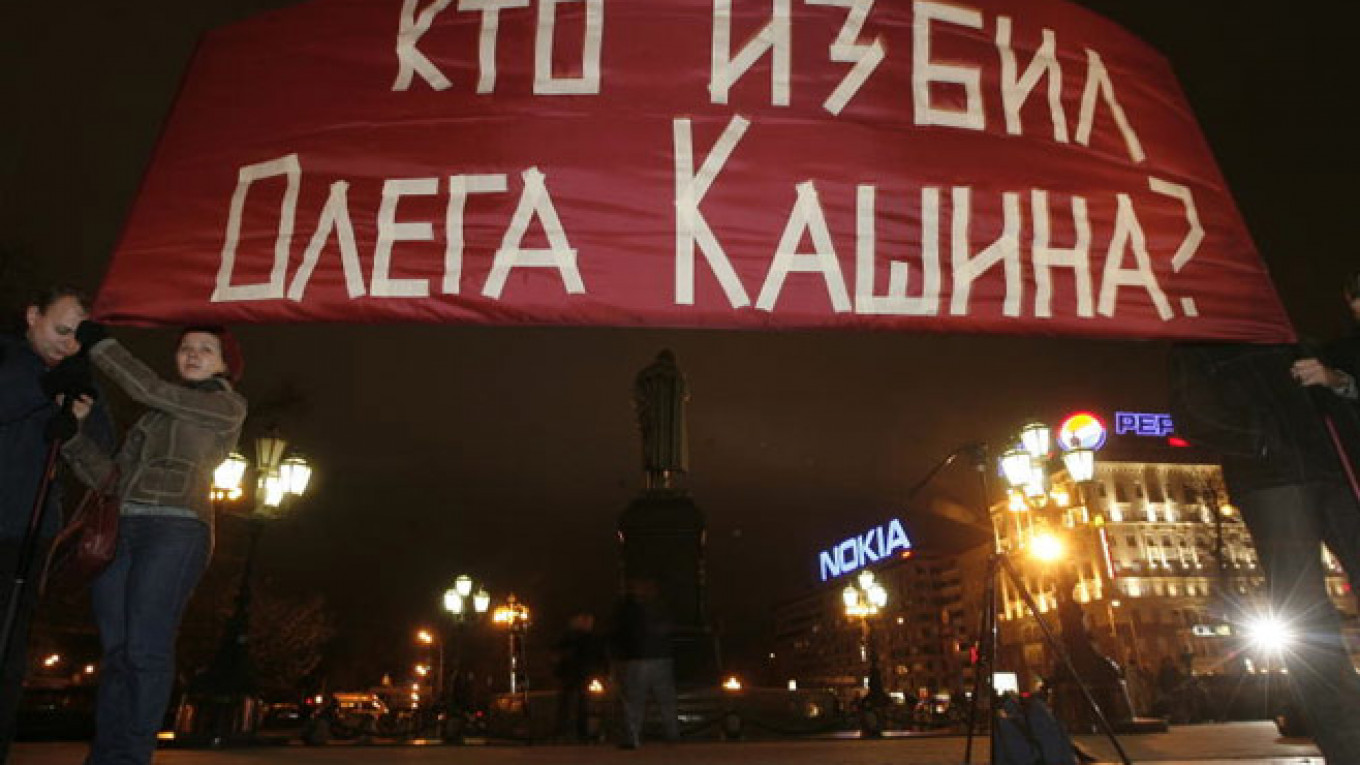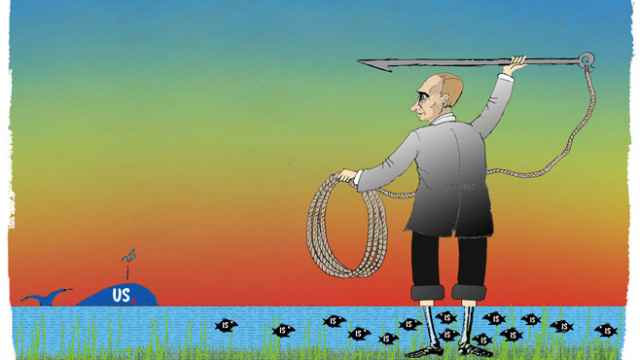Journalist Oleg Kashin — victim of a violent 2010 attack that nearly killed him — has made waves in Russia by penning a scathing open letter to President Vladimir Putin and Prime Minister Dmitry Medvedev.
The crime against Kashin appears to be solved, you see. But the man accused of ordering the attack is also the governor of an entire Russian region — Pskov, to be precise. And now Kashin says that the investigator on the case has admitted that there is no political will to actually charge the governor, Andrei Turchak, with the crime. And it is political will — as opposed to the notion of equality before the law — that makes or breaks cases such as this one.
Kashin's letter to the Russian leaders is as thunderous as it is devastating. In it, he directly accuses Putin and Medvedev of fostering a climate of utter cynicism and lawlessness in Russia.
"Don't flatter yourself about your 15 years [of rule]," Kashin wrote, "It was not a time of Russia's rebirth, or of Russia getting up off of its knees, but it was a time of the greatest moral catastrophe our generation has lived through. You are personally responsible for this catastrophe."
Kashin also points out that a morally degraded populace inevitably turns on its leaders. This, perhaps, is the most chilling aspect of an already chilling essay.
I would argue that Kashin's letter needs to be treated as more than a brilliantly written, bitter accusation — though it certainly works well in the emotional sense.
Ultimately though, Kashin's letter is a historical document. By calling it a "Letter to the Russian Leaders," he has channeled Alexander Solzhenitsyn's "Letter to the Soviet leaders," and though some may argue that Kashin is flattering himself by adopting Solzhenitsyn's methods, the truth is, Kashin is right to appeal to history and adopt a classical dissident style.
Plenty of people, including prominent members of the opposition, have already chided Kashin for even bothering to address what they see as "an absolute evil."
Yet Russia, more so than other countries, I would argue, is the sort of place where words can come to matter more than actions.
It's a strange paradox, of course. As writer Peter Pomerantsev argued in his book, "Nothing is True and Everything is Possible," words have lost much of their meaning in Putin's Russia. Up is down, black is white. Morality has been replaced by whataboutism. Any righteous outcry against injustice perpetrated on Russian soil is met with "But American cops shoot black people, so whatever." Television channels Orwell while the courts channel Kafka. All is lost.
The question is — what to do with all of that now? Some hope for the fires of revolution. Other critics, especially those abroad, frequently express the hope that Russia will simply cease to exist (as if the disintegration of the world's largest, territorially speaking, country will not be a cataclysm — both for the country in question and for its many neighbors).
I would, foolishly perhaps, hope that the written word will change and redeem Russia.
Of course, I have no illusions when it comes to Russian infrastructure, legislation, economy, or general bureaucracy. No great turn of phrase can pierce the darkness of those particular labyrinths.
But if Russia is to begin grasping for morality again — and I don't mean the kind of TV-sanctioned, saccharine "morality" that dictates that dancing in a cathedral should earn you two years in jail, while religious extremists who attack art exhibitions get off scot-free, but actual morality — it should turn to writers and thinkers to guide it.
Kashin's letter is as good of a start as any. First of all, it draws a clear line between right and wrong, for a change. Covering up the misdeeds of powerful officials because such misdeeds may indict the entire system of government is wrong, for example. Transparency and accountability are right. The Russian state can stick with the former — and lose, in the end, much more than its moral legitimacy, or it can begin the painful, awkward, drawn out, and often thankless process of attaining the latter.
Precisely because transformation is painful, Russia needs its Kashins — its fiery, unapologetic, righteous, even desperate thinkers — more than ever. One of the reasons as to why the chaos of the 1990s was so easy to transform into an excuse for pseudo-authoritarianism today, I would argue, is because the most powerful thinkers of the age had frequently blended into the scenery and were not heard as far and wide as they should have been. There wasn't that sense of clarity, of pure outrage. But now, times have changed.
If I was one of the leaders addressed in Kashin's letter, I would study it carefully. I would ask myself if a system that would make me look "weak" for responding to it, or even doing as little as reflecting upon it, is such a great system after all. I would consider the letter's implications — the possibility that the nation's moral compass is irrevocably broken — and what that would mean for me, and for everyone else, down the line.
The great thing about words is that they are sometimes more alive than people are. People can be maimed, killed, jailed, "disappeared." Words live on. Even after they are twisted and perverted beyond all recognition, words roar back, like thunderbirds in Sylvia Plath's proverbial spring. If the word was at the beginning, the end is silence.
Kashin was beaten precisely because the man who ordered his attack understood that words have power. And ironically and beautifully enough, the horrific violence perpetuated against Kashin only made his words that much more powerful.
There is a lesson in there for all of Russia to learn. Not just its leaders. Though it would be great if the learning process could begin with them.
Natalia Antonova is an American playwright and journalist.
A Message from The Moscow Times:
Dear readers,
We are facing unprecedented challenges. Russia's Prosecutor General's Office has designated The Moscow Times as an "undesirable" organization, criminalizing our work and putting our staff at risk of prosecution. This follows our earlier unjust labeling as a "foreign agent."
These actions are direct attempts to silence independent journalism in Russia. The authorities claim our work "discredits the decisions of the Russian leadership." We see things differently: we strive to provide accurate, unbiased reporting on Russia.
We, the journalists of The Moscow Times, refuse to be silenced. But to continue our work, we need your help.
Your support, no matter how small, makes a world of difference. If you can, please support us monthly starting from just $2. It's quick to set up, and every contribution makes a significant impact.
By supporting The Moscow Times, you're defending open, independent journalism in the face of repression. Thank you for standing with us.
Remind me later.








